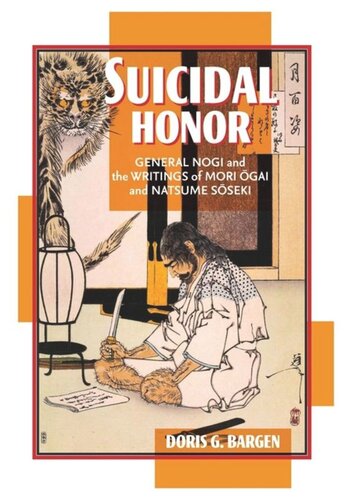

Most ebook files are in PDF format, so you can easily read them using various software such as Foxit Reader or directly on the Google Chrome browser.
Some ebook files are released by publishers in other formats such as .awz, .mobi, .epub, .fb2, etc. You may need to install specific software to read these formats on mobile/PC, such as Calibre.
Please read the tutorial at this link: https://ebookbell.com/faq
We offer FREE conversion to the popular formats you request; however, this may take some time. Therefore, right after payment, please email us, and we will try to provide the service as quickly as possible.
For some exceptional file formats or broken links (if any), please refrain from opening any disputes. Instead, email us first, and we will try to assist within a maximum of 6 hours.
EbookBell Team

4.4
12 reviewsOn September 13, 1912, the day of Emperor Meiji’s funeral, General Nogi Maresuke committed ritual suicide by seppuku (disembowelment). It was an act of delayed atonement that paid a debt of honor incurred thirty-five years earlier. The revered military hero’s wife joined in his act of junshi ("following one’s lord into death"). The violence of their double suicide shocked the nation. What had impelled the general and his wife, on the threshold of a new era, to resort so drastically, so dramatically, to this forbidden, anachronistic practice? The nation was divided. There were those who saw the suicides as a heroic affirmation of the samurai code; others found them a cause for embarrassment, a sign that Japan had not yet crossed the cultural line separating tradition from modernity.
While acknowledging the nation’s sharply divided reaction to the Nogis’ junshi as a useful indicator of the event’s seismic impact on Japanese culture, Doris G. Bargen in the first half of her book demonstrates that the deeper significance of Nogi’s action must be sought in his personal history, enmeshed as it was in the tumultuous politics of the Meiji period. Suicidal Honor traces Nogi’s military career (and personal travail) through the armed struggles of the collapsing shôgunate and through the two wars of imperial conquest during which Nogi played a significant role: the Sino-Japanese War (1894–1895) and the Russo-Japanese War (1904–1905). It also probes beneath the political to explore the religious origins of ritual self-sacrifice in cultures as different as ancient Rome and today’s Nigeria. Seen in this context, Nogi’s death was homage to the divine emperor. But what was the significance of Nogi’s waiting thirty-five years before he offered himself as a human sacrifice to a dead rather than living deity? To answer this question, Bargen delves deeply and with great insight into the story of Nogi’s conflicted career as a military hero who longed to be a peaceful man of letters.
In the second half of Suicidal Honor Bargen turns to the extraordinary influence of the Nogis’ deaths on two of Japan’s greatest writers, Mori Ôgai and Natsume Sôseki. Ôgai’s historical fiction, written in the immediate aftermath of his friend’s junshi, is a profound meditation on the significance of ritual suicide in a time of historical transition. Stories such as "The Sakai Incident" ("Sakai jiken") appear in a new light and with greatly enhanced resonance in Bargen’s interpretation. In Sôseki’s masterpiece, Kokoro, Sensei, the protagonist, refers to the emperor’s death and his general’s junshi before taking his own life. Scholars routinely mention these references, but Bargen demonstrates convincingly the uncanny ways in which Sôseki’s agonized response to Nogi’s suicide structures the entire novel. By exploring the historical and literary legacies of Nogi, Ôgai, and Sôseki from an interdisciplinary perspective, Suicidal Honor illuminates Japan’s prolonged and painful transition from the idealized heroic world of samurai culture to the mundane anxieties of modernity. It is a study that will fascinate specialists in the fields of Japanese literature, history, and religion, and anyone seeking a deeper understanding of Japan’s warrior culture.